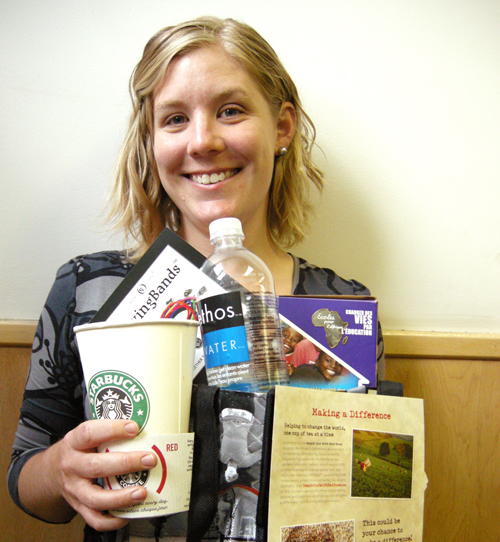
You want to support international development, and there’s a company ready to show you how. Buy a bottle of their water, and the company will make a donation to help build wells to provide clean water for communities in developing countries. Buy a package of another company’s disposable diapers, and the manufacturer will donate enough money to vaccinate a child in Africa.
Can you really save the world by shopping? That’s the question Prof. Roberta Hawkins explored in a recent study of what she calls “cause-related marketing.” That’s when corporations and non-profits work together to promote a product and a social cause, such as some aspect of international development. Buy the product and help the cause.
“The idea is appealing to people; without changing what we do in our everyday lives, we can help,” says Hawkins. “The ads foster that idea by talking about participating and being an activist for the cause, when all you are actually doing is consuming.”
How much, in fact, do these campaigns actually help? Hawkins points out that some campaigns are extremely hypocritical. Bottled water and disposable diapers, for example, are both known to be harmful to the environment, but that becomes overshadowed by the new associations created through advertising. “The campaign stops us from looking at the diapers and the problems they cause,” says Hawkins. “Instead they are the solution, the route to saving babies.” It’s even difficult to critique a campaign like this because you come across as not caring about saving babies’ lives, she adds.
The campaign, she adds, promotes an imaginary idea of global motherhood: the idea that all mothers are in this together, and mothers will cooperate to solve this problem. “The reality is that you’re just buying diapers.”
And expensive diapers, at that. Hawkins estimates in her study that if consumers bought a pack of generic diapers rather than the brand featured in the campaign, then took the money they saved and donated it directly to UNICEF, they’d be able to purchase 144 vaccines for children in need rather than the single vaccine dose donated when the campaign diapers are purchased. That’s 144 to one.
Hawkins became interested in this topic because it pulls together several issues she feels are important. She initially did her undergraduate work in geography at Queen’s University, majoring in environmental science, and then went to York University to complete a master’s degree in environmental studies. She was deeply interested in both feminist issues and international development and edited a feminist magazine while at Queen’s. She’d previously travelled and worked in Mexico and Bolivia, but went to Mongolia for her master’s research on gender and water use.
“Usually in developing countries, women are primarily responsible for collecting water,” Hawkins explains. “This can take many hours every day and puts the woman at risk of injuries. Often the woman continues to be in charge of deciding how the water is used at home and making sure it is safe for the rest of the family to drink.”
In Mongolia, she found men and women both participated in collecting water, with men bringing water back home more than 50 per cent of the time. “They even collected water by hand (as opposed to using a cart), which was an unexpected finding,” according to Hawkins. This information is valuable, she explains, because organizations seeking to help developing countries need to have specific information about cultural practices that can vary from one place to another.
When she moved to Clark University in Massachusetts to work on her PhD, Hawkins felt she wanted to explore issues of gender and international development within the North American context. That’s what led her to the shopping-to-save-the-world research.
“These campaigns are often very opaque,” she comments. “It can be difficult to find out which organizations are getting the money or how much is actually donated.” But when she was able to interview the people involved, she found some positive aspects. “The heads of the NGOs and corporations that I interviewed truly see these campaigns as good things, a great way to help. If people are buying things anyway, it’s good to have a donation attached.”
But Hawkins sees a number of problems. “I take the messages in these campaigns very seriously because they affect how we are in the world, how we make decisions about purchases, and how we think about people in other parts of the world. There is a suggestion that women in developing countries are victims who need women in North America to save them, and that the only way North American women can help is by purchasing products. You can believe that you’re doing enough and that this is all you can do.”
Hawkins completed her PhD in May and joined the Guelph’s Department of Geography at the beginning of July. She’s looking forward to riding her bike along some of the trails and routes in town, doing a little knitting, and, maybe, some carefully considered shopping.